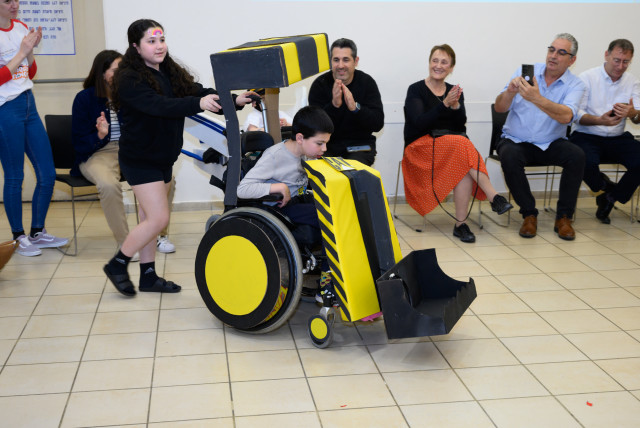Child disability organization faces challenges during the war

Six months into the Gaza war, how is one child disability organization coping?
The outbreak of the Israel-Hamas war and the horrors of October 7 sent Israel Elwyn’s early intervention centers into chaos, said the director of Elwyn’s Haifa and Northern Israel Branch, Keren Strul.
“Like the rest of the country, we were caught unaware,” she said. “There were hardly any [early intervention] frameworks in which the war did not have a personal impact on each of the families.”
Proving services to thousands of people in Israel with disabilities
Elwyn Israel provides services to over 5,400 people in Israel with disabilities, and its early intervention centers provide rehabilitation and treatment to children from six months to three years old.
The centers treat kids with developmental delays and autism, and research shows that this early intervention can have a significant impact on their progression, the organization explained.
Elwyn’s goal, and one of the goals of the intervention centers, is to provide people with tools to promote their independence and involvement in the community, and they work based on the belief that everyone deserves to be included in society.
The children treated at these centers go through a daily schedule that is very similar to what children their age experience in other frameworks, but in addition to their preschool day, they receive a wide variety of treatment, including occupational, speech, and physical therapy.
From the outbreak of the war, it took around two weeks until Elwyn was able to overcome the chaos of the beginning and to get organized, said Strul.
“My organization knows how to quickly get on board and offer services in an emergency, in the war, as it did in the corona pandemic,” she explained. “We were one of the first organizations to provide services” after the war’s outbreak, she said.
Strul noted how important her organization’s ability to work independently was, because it meant that Elwyn did not have to “wait for the Welfare and Social Affairs Ministry or the Home Front Command, who first needed to handle things that were bigger than intervention centers.”
Her work was very emotional, helping parents handling impossible situations, as she coped with the war herself, Strul shared.
“An experience that touched me personally was the story of one of the mothers from the North,” Strul shared. The mother “was evacuated and had just received a diagnosis that her child is autistic. Before she came to us, she didn’t know what to do,” Strul said, explaining that the mother was forced to leave her home right after receiving her child’s diagnosis and had no idea what framework was appropriate for, or accessible to, her child during the war.
To make matters more complicated, this mother’s husband was called to reserve duty and was unreachable in Gaza. She then she found out she was pregnant with her second child.“You have to understand that the evacuees have a very difficult experience because they have been uprooted from their homes,” said Strul, explaining that things are especially hard when you “uproot a child with a disability from their home.”
Strul shared that she marveled at the difficulty of the situation, asking herself how she could help someone handling so much chaos.
“She [the mother] really fell apart,” described Strul.
Along with her team, Strul helped the mother to find an appropriate framework, and providing this help gave Strul the chance to take action, which, in turn, helped her handle her own experience. It “made me sharper and kept me from sinking in the sadness and terrible grief we are all dealing with,” she explained.
Personally helping this woman “took me to a place of ‘okay, I have a job to do, and I need to lead the team and help the families, and have some routine,’” she said, adding that this story made her stronger.
ANOTHER ELEMENT that made things emotionally difficult for many employees and intervention center families was the mixed Arab-Jewish nature of many of Elwyn’s teams, said Strul.
This proximity at work “brought up the conflict that exists in the country,” she said. It was hard to avoid sensitive topics, at a time when tensions and emotions were so high.
There were “parents whose children were in preschools with Arab staff,” which brought up fears for some of them, described Strul, adding that “this also impacted Arab employees who encountered Jewish parents who were uncomfortable with them.”
Strul handled these feelings with open communication. “You have to give these feelings space,” she said. “If you pretend these feelings don’t exist, they will come out in the end. So, first of all, we decided that we were going to give them space and talk about them on a local level.
“If we saw that there were problems or conflicts, feelings that sometimes aren’t apparent on the surface but are under the surface, we addressed them,” she said.
IN ADDITION to the emotional turmoil of helping the families from their centers, Elwyn’s staff had to contend with numerous logistical hurdles.
Some of the centers did not have appropriate shelters and needed to be totally relocated to spaces with adequate protection. Some centers were too close to conflict zones, and needed to be totally evacuated.
The organization offered a variety of solutions, depending on the stage of the war and the unique needs it presented.
“We offered services from afar, using videos. An occupational therapist would show parents how to help with their child’s treatment at home,” said Strul, who added that the organization recruited numerous volunteers to help provide these services.
The organization also prepped the center’s shelters and drilled taking the children into the shelter in the appropriate time frame. Elwyn staff created special activities for the children to do while they were in shelters, to try to make the time pass more calmly.
Caring for these families in the chaos of the war was an incredible challenge, but no less of a challenge was the job of caring for the early intervention center staff, Strul explained.
“The son of one of our workers was murdered at the [Super]nova music festival,” Strul recounted. “It was a shock, encountering that on a personal level, when one of your workers loses her 21-year-old son. She was totally broken,” said Strul, who added that handling this loss of someone who is a daily part of her life caused her to break down as well.
“We accompanied her for the whole shiva [mourning period] and we were with her and came to visit her,” Strul said, adding that they also provided space for the staff to process the loss together.
Many of Strul’s staff were also evacuated from their homes in the North. “There was a lot of thought put into what happens with those workers, how can we help them so they will come back to a sort of schedule,” Strul explained.
“I don’t think there was a single worker who did not get the care they needed,” she said.Looking forward, Strul feels prepared to handle whatever the continuation of the war, or possible escalation in the north, might throw their way.
There is a feeling that the war is present. “There could be a siren today,” said Strul, “but it doesn’t occupy us daily.”
“What is important is that, in an emergency, the staff knows what to do with each child, where to take them, where the safe area is for each structure, who the Home Front Command contact is, what is in the shelter, what equipment,” she explained.
Unexpected events will always be present, but Strul isn’t worried. When asked why, her answer is simple: “Because we are prepared for it.”
Jerusalem Post Store
`; document.getElementById("linkPremium").innerHTML = cont; var divWithLink = document.getElementById("premium-link"); if (divWithLink !== null && divWithLink !== 'undefined') { divWithLink.style.border = "solid 1px #cb0f3e"; divWithLink.style.textAlign = "center"; divWithLink.style.marginBottom = "15px"; divWithLink.style.marginTop = "15px"; divWithLink.style.width = "100%"; divWithLink.style.backgroundColor = "#122952"; divWithLink.style.color = "#ffffff"; divWithLink.style.lineHeight = "1.5"; } } (function (v, i) { });

